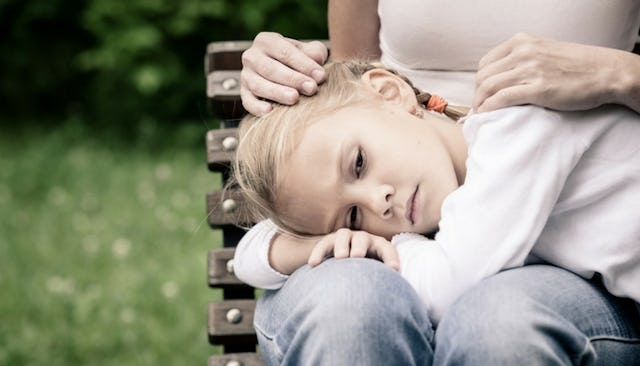Kids Need Mental Health Days Too

What do you do when your child wants to stay home from school but they aren’t sick? Do you allow them to take a day off if they say they need it?
I was a model high school student by practically every measure. I got good grades in honors classes, was involved in various clubs and activities, and had a healthy network of friends. I never skipped school, never got into trouble, and never caused my parents or teachers any undue grief.
Related: How To Identify The Signs Of Potential Mental Illness In Your Child, According To An Expert
I usually walked the 1 1/2-mile trek to school, but one day during my sophomore year, I asked my dad to drive me. I’d been up late studying for a test that I didn’t feel prepared for, and I didn’t think I’d make it to school on time if I walked.
As my dad drove me to school, I could feel it welling up inside — the pressure, the overwhelm, the exhaustion. I looked out the window and tried to pull it together, but my dad could sense something was wrong. He asked if I was okay, and the dam broke. “I think I need a mental health day,” I squeaked, as the tears started to fall.
My dad did the best thing he could have done in that moment — he immediately turned the car around. I told him I had a test that day, and he said he was sure I’d be able to make it up. “I need mental health days sometimes, too,” he said. I exhaled, the weight of my young world slipping off my shoulders.
It was one of those moments from my upbringing that really stuck with me. That sense of understanding from my father, the message that self-care is important, the permission to take time when you really need it. That simple act of turning the car around without question was one of the most validating things I’ve ever experienced.
Childhood and adolescence are hard — harder than we often give them credit for being. Kids and teens are constantly growing, learning, and figuring out how to navigate the world. They are surrounded by adults telling them what to do and what not to do, and by peers often telling them the opposite. Their present is filled with schoolwork, activities, family time, friendships, and admonitions to think about their future. Add on the fact that many kids are dealing with anxiety or depression, bullying, learning disabilities, or other mental and emotional challenges, and it’s pretty clear that most kids and teens aren’t living simple, carefree lives.
I know a lot of people think kids these days are too coddled. The term “special snowflake” gets tossed around as the consummate label for a generation of children perceived to be treated as delicate, fragile souls who can’t handle the inevitable challenges they’re going to face in life. I understand that sentiment in many instances. I really do.
However, I don’t think giving kids occasional mental health days is coddling. Not when we have a population of people who do not know how to prioritize self-care. I’ve seen both kids and adults who reach the point of burnout, who either suffer the health consequences of overextending themselves or from self-medicating habits with various kinds of addictions to numb themselves. That’s not what I want for my kids.
It’s important to teach our children to work hard, to do their best, to strive for excellence, absolutely. But it is equally important to teach them to listen to their mind, body, and soul, and to recognize when they need to take a break. Adults get personal and sick days — why shouldn’t kids get them too? As long as a kid isn’t being habitually lazy or taking advantage of a parent’s sympathies, letting them stay home from school when they aren’t physically sick is a good idea once in a while.
Of course, it’s not always that simple. Many parents work outside the home and can’t simply take a sick day for their kid who is emotionally struggling. Though I could argue that mental health is as important as physical health, our society doesn’t view them the same way. But maybe we should.
It’s easy as adults to think that children’s lives are simple, that their problems are small just because their bodies are. But they’re not. If your kid tells you they need a day off to breathe, don’t dismiss them out of hand. Teach them that their mental health is important. Give them the tools they need to tackle life’s challenges, and include self-care in that toolbox.
We all need mental health days on occasion. Teaching kids when to recognize when they truly need a break and giving them permission to take it is a gift that they will cherish well into adulthood.
This article was originally published on